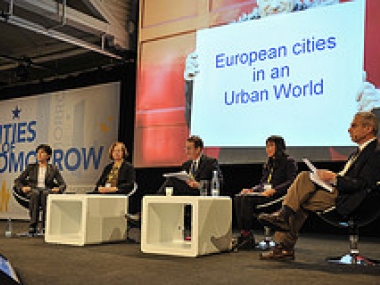Annual Conference Output - European Cities in an Urban World
Edited on
10 February 2015How the European urban city model can be improved with lessons from other parts of the world? This was discussed during the URBACT Annual Conference round table "European Cities in an Urban World" held in Copenhagen last December. The topics cohesive and sustainable cities, creating a resilient and inclusive economy as well as governance were in the heart of the discussions. Read the results of this round table!

Susan Fainstein, professor at Harvard University, drew on U.S. examples to examine ways of balancing growth and equity in urban policies. Cities should focus on educational training and providing urban amenities, instead of subsidizing business. They also need to better evaluate costs and benefits. Expensive "mega-projects" often create less growth than modestly priced projects, such as New York’s Highline.
Belinda Yuen, a planner at the National University of Singapore, also saw a tension between growth and equity in Asia's exploding mega-cities. The latter provide many social opportunities, but also face daunting challenges. As a result, Asian cities have become veritable "laboratories" for planning and sustainable development, with many lessons for their European counterparts.
Patricia Torres explained how the Inter-American Development Bank (IDB) is helping make growth more inclusive in Latin American cities. When it invests in poor urban neighborhoods, the Bank focuses on human improvement rather than expensive infrastructures, and it deals with existing communities rather than trying to create new urban areas. This approach allows it to spur broad growth with limited resources.
Alessandro Balducci, planner and Vice-rector of the Politecnico di Milano, seconded this emphasis on networking. He discussed how informal cooperation can overcome the limits of formal city institutions, whose boundaries and structures are often outdated. Spurred by new technologies and a network mentality, informal cooperation can at once revitalize local areas and foster broad metropolitan visions, as in the case of the "Greater Paris" project.
Read more:
Submitted by admin on
